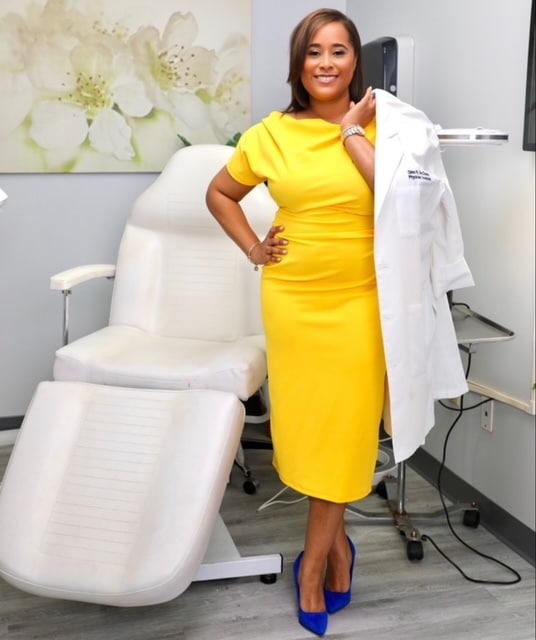
In 2015, Ommi McCluney’s life took a dramatic and unexpected turn. An athlete who once rode her bike 60 miles on weekends and played college basketball, she suddenly found herself unable to climb three flights of stairs without gasping for air.
Doctors diagnosed her with anti-synthetase syndrome, a rare autoimmune condition that can cause severe muscle pain, skin inflammation, and—most critically—lung fibrosis. In her case, the disease triggered pulmonary hypertension, which rapidly progressed to life-threatening pulmonary fibrosis.
By January 2020, McCluney’s oxygen levels were dangerously low. She collapsed during a trip to the Grand Canyon and had to be airlifted to Phoenix. There, she was told bluntly: without a double lung transplant, she wouldn’t survive much longer.
“My oxygen levels were around 75–80% when normal is 90% and above,” she tells BlackDoctor.org.
Back home in Houston, she was placed on the transplant list in April 2020. Just five months later—on September 15, 2020—she received her new lungs.
When Medicine and Personal Struggle Collide
Shortly after starting her career as a physician assistant in dermatology, McCluney began noticing dramatic changes in her skin.
“I was in the heart of my illness, using oxygen daily and on high doses of prednisone. Prednisone kept inflammation down so I could breathe, but it caused severe acne, weight gain, and high glucose,” she shares. “I had very severe acne and hyperpigmentation. As a dermatologist, I was treating patients to help them look better, but I couldn’t treat myself. The medications I prescribed for patients would burn and irritate my own skin,” she adds.
The antibiotics she took also made her skin burn and react to sunlight.
Rather than accept that as her new normal, McCluney decided to innovate. She created Resilience Skincare, starting with a gentle retinol cream designed for people with sensitive skin or medical conditions that make traditional retinol products too harsh.
RELATED: She Doesn’t Just Do Hair—She Heals Souls.
More Than Beauty: A Mission for Inclusive Care
Resilience Skincare is more than a product line; it’s a statement of advocacy. McCluney is committed to developing affordable, effective skincare for people with chronic illnesses, sensitive skin, and darker skin tones, communities often overlooked by mainstream beauty brands.
“A lot of skincare brands sell to big companies and formulas change. I’m promising myself not to do that. My products will always cater to people with sensitivities and melanated skin,” she explains.
Her future plans include expanding the line with a safe facial cleanser and sunscreen by the end of the year—all tailored for sensitive, melanated skin.
Breaking Down Myths About Skin Health
In her clinical work, McCluney also pushes back against common misconceptions:
- Dandruff is normal. “Dandruff is not normal. It’s a treatable condition that may be connected to gut health, medications, or other medical issues.”
- Black people don’t need sunscreen. “Melanin protects against some cancers but not free radical damage, fine lines, wrinkles, hyperpigmentation, or melasma.”
- All hair loss is alopecia. “Not all hair loss is alopecia. It could be vitamin deficiencies, medical illness, or tension from hairstyles.”
- Dry, flaky skin is just ‘sensitive skin.’ “It could be seborrheic dermatitis — an overproduction of yeast.”
Her approach always connects skin symptoms to overall health.
“If your skin shows signs of inflammation — rashes, bumps, dryness, flakiness, dandruff, hair thinning — see a dermatologist. The skin is the largest organ, and problems often signal something going on internally,” she advises. “In the Black community, we have the highest rates of autoimmune conditions. When patients present with new, unexplained skin changes, I’m always thinking about possible underlying conditions.”
Confidence, Care, and Community
For those struggling with skin issues that affect their self-esteem, McCluney offers both hope and practical advice.
“There’s always a solution. As long as you have breath in your body, you can fix what you want to change about yourself — with the right guidance and knowledge. TikTok is not always the answer; you need credible sources,” she says.
Through her clinic in Houston—Moore Dermatology, where over 90 percent of her patients are Black—she provides both in-person and online consultations, even offering free skin analyses through her website.
“God gave me another life,” McCluney says. “My purpose is to use that gift to help others—through medicine, advocacy, and education.”
Looking Ahead
McCluney’s next chapter is about growth, advocacy, and leadership. She hopes to get Resilience Skincare into major retailers, expand her product line, and eventually step into a larger advocacy role—pushing for more inclusive policies in medicine and skincare.
“I want to make sure our communities are seen, heard, and cared for—both in the clinic and on the shelves,” she concludes.
Learn more about Ommi McCluney’s work and products here.









